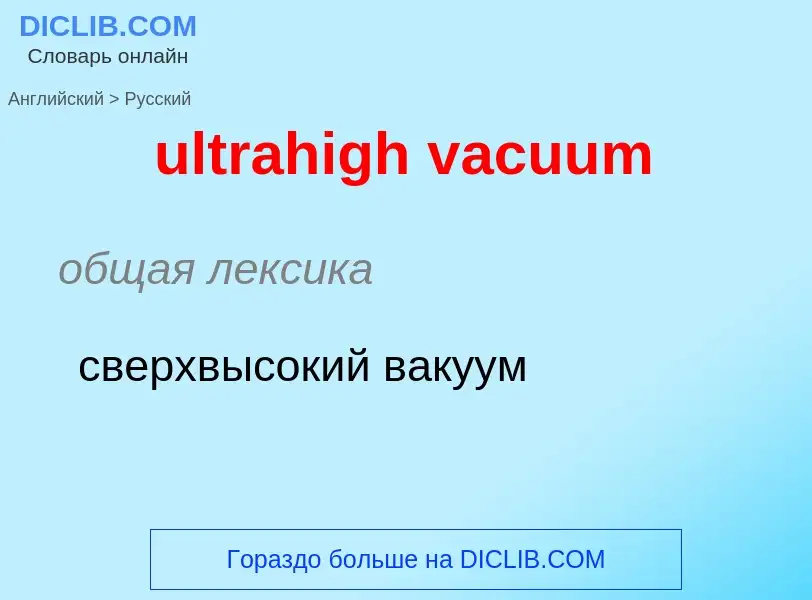Μετάφραση και ανάλυση λέξεων από την τεχνητή νοημοσύνη ChatGPT
Σε αυτήν τη σελίδα μπορείτε να λάβετε μια λεπτομερή ανάλυση μιας λέξης ή μιας φράσης, η οποία δημιουργήθηκε χρησιμοποιώντας το ChatGPT, την καλύτερη τεχνολογία τεχνητής νοημοσύνης μέχρι σήμερα:
- πώς χρησιμοποιείται η λέξη
- συχνότητα χρήσης
- χρησιμοποιείται πιο συχνά στον προφορικό ή γραπτό λόγο
- επιλογές μετάφρασης λέξεων
- παραδείγματα χρήσης (πολλές φράσεις με μετάφραση)
- ετυμολογία
ultrahigh vacuum - translation to ρωσικά
общая лексика
сверхвысокий вакуум
['vækju(ə)mkli:niŋ]
общая лексика
чистка пылесосом
Ορισμός
Βικιπαίδεια
Ultra-high vacuum (UHV) is the vacuum regime characterised by pressures lower than about 100 nanopascals (1.0×10−7 Pa; 1.0×10−9 mbar; 7.5×10−10 Torr). UHV conditions are created by pumping the gas out of a UHV chamber. At these low pressures the mean free path of a gas molecule is greater than approximately 40 km, so the gas is in free molecular flow, and gas molecules will collide with the chamber walls many times before colliding with each other. Almost all molecular interactions therefore take place on various surfaces in the chamber.
UHV conditions are integral to scientific research. Surface science experiments often require a chemically clean sample surface with the absence of any unwanted adsorbates. Surface analysis tools such as X-ray photoelectron spectroscopy and low energy ion scattering require UHV conditions for the transmission of electron or ion beams. For the same reason, beam pipes in particle accelerators such as the Large Hadron Collider are kept at UHV.




![The power unit of a typical [[central vacuum cleaner]] for residential use The power unit of a typical [[central vacuum cleaner]] for residential use](https://commons.wikimedia.org/wiki/Special:FilePath/Drainvac central vacuum with air inlet.jpg?width=200)




![Astronaut [[Tracy Caldwell Dyson]] vacuums equipment on the [[International Space Station]] Astronaut [[Tracy Caldwell Dyson]] vacuums equipment on the [[International Space Station]]](https://commons.wikimedia.org/wiki/Special:FilePath/ISS-24 Tracy Caldwell Dyson during housekeeping.jpg?width=200)
![Kirby]] G5 vacuum cleaner Kirby]] G5 vacuum cleaner](https://commons.wikimedia.org/wiki/Special:FilePath/Kirby G5 upright vacuum cleaner - 20140913.jpg?width=200)


![Housemaid]] using "dedusting pump", {{Circa}} 1906. Housemaid]] using "dedusting pump", {{Circa}} 1906.](https://commons.wikimedia.org/wiki/Special:FilePath/Vacuum Cleaner 1906.jpg?width=200)






